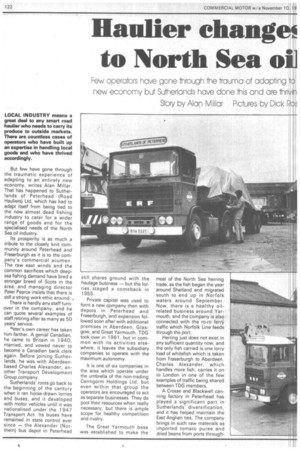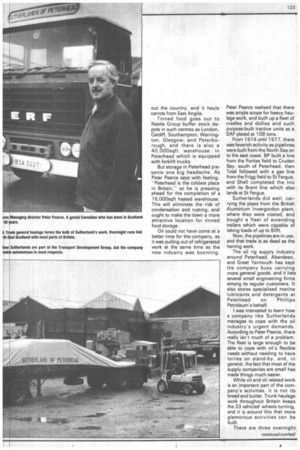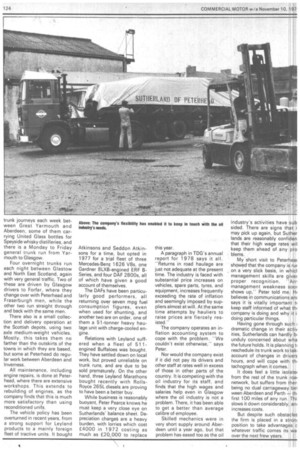Haulier changef to North Sea oh
Page 124

Page 125

Page 126

If you've noticed an error in this article please click here to report it so we can fix it.
Few ooerators have gone nrough e trauma of adapting to
new economy but Su-nerlancs have done his anc are lhrivin Story by Alan Millar Pic-ures by Dick -Ro.
LOCAL INDUSTRY means a great deal to any smart road haulier who needs to carry its produce to outside markets. There are countless cases of operators who have built up an expertise in handling local goods and who have thrived accordingly.
But few have gone through the traumatic experience of adapting to an entirely new economy, writes Alan Millar. That has happened to Sutherlands of Peterhead (Road Hauliers) Ltd, which has had to adapt itself from being tied to the now almost dead fishing industry to cater for a wider range of goods and for the specialised needs of the North Sea oil industry.
Its prosperity is as much a tribute to the closely knit community around Peterhead and Fraserburgh as it is to the company's commercial acumen. The raw east winds and the common sacrifices which deepsea fishing demand have bred a stronger breed of Scots in the area, and managing director Peter Pearce insists that there is still a strong work ethic around. , There is hardly any staff turnover in the company, and he can quote several examples of staff retiring after as many as 50 years' service.
Deters own career has taken him farther. A genial Canadian, he came to Britain in 1940, married, and vowed never to become a Canadian bank clerk again. Before joining Sutherlands, he was with Aberdeenbased Charles Alexander, another Transport Development Group company.
Sutherlands' roots go back to the beginning of the century when it ran horse-drawn lorries and buses, and it developed with motor vehicles until it was nationalised under the 1947 Transport Act. Its buses have remained in state control ever since — the Alexander (Northern) bus depot in Peterhead still shares ground with the haulage business — but the lorries staged a comeback in 1955.
Private capital was used to form a new company then with depots in Peterhead and Fraserburgh, and expansion followed soon after with additional premises in Aberdeen, Glasgow, and Great Yarmouth. TOG took over in 1961, but in common with its activities elsewhere, it leaves the subsidiary companies to operate with the maximum autonomy.
It is one of six companies in the area which operate under the umbrella of the non-trading Cairngorm Holdings Ltd, but even within that group the operators are encouraged to act as separate businesses. They do pool their resources when really necessary, but there is ample scope for healthy competition and rivalry.
The Great Yarmouth base was established to make the most of the North Sea herring trade, as the fish began the year around Shetland and migrated south to end up in Norfolk waters around September. Now, there is a healthy oilrelated business around Yarmouth, and the company is also connected with the ro-ro ferry traffic which Norfolk Line feeds through the port.
Herring just does not exist in any sufficient quantity now, and the only fish carried is one lorry load of whitefish which is taken from Fraserburgh to Aberdeen. Charles Alexander, which handles more fish, carries it on to London in one of the few examples of traffic being shared between TOG members.
A Crosse and Blackwell canning factory in Peterhead has played a significant part in Sutherlands' diversification, and it has helped maintain the East Anglian ties. The company brings in such raw materials as imported tomato puree and dried beans from ports through out the country, and it hauls • carrots from East Anglia.
Tinned food goes out to Nestle Group buffer stock depots in such centres as London, Cardiff, Southampton, Warrington, Glasgow, and Peterborough, and there is also a 40,000sqft warehouse in Peterhead which is equipped with forklift trucks.
But storage in Peterhead precents one big headache. As Peter Pearce says with feeling, "Peterhead is the coldest place in Britain," so he is pressing ahead for the completion of a 16,000sqft heated warehouse. This will eliminate the risk of condensation and rusting, and ought to make the town a more attractive location for tinned food storage.
Oil could not have come at a better time for the company, as it was pulling out of refrigerated work at the same time as the new industry was booming. Peter Pearce realised that there was ample scope for heavy haulage work, and built up a fleet of cradles and dollies and such purpose-built tractive units as a DAF plated at 108 tons.
From 1974 until 1977, there was feverish activity as pipelines. were built from the North Sea on to the east coast. BP built a line from the Forties field to Cruden Bay, south of Peterhead, then Total followed with a gas line from the Frigg field to St Fergus, and Shell completed the trio with its Brent line which also lands at St Fergus.
Sutherlands did well, carrying the pipes from the British Aluminium Invergordon plant, where they were coated, and . bought a fleet of extending trailers which were capable of taking loads of up to 80ft.
Now, the pipelines are in use, and that trade is as dead as the herring work.
The oil rig supply industry around Peterhead, Aberdeen, and Great Yarmouth has kept the company busy carrying more general goods, and it lists several small engineering firms among its regular customers. It also stores specialised marine lubricants and detergents at Peterhead on Phillips Petroleum's behalf.
I was interested to learn how a company like Sutherlands manages to cope with the oil industry's urgent demands. According to Peter Pearce, there really isn't much of a problem. The fleet is large enough to be able to cope with oil's flexible needs without needing to have lorries on stand-by, and, in general, the fact that most of the supply companies are small has made things much easier.
While oil and oil related work is an important part of the company's activities, it is not its bread and butter. Trunk haulage work throughout Britain keeps the 33 vehicles' wheels turning, and it is around this that more glamorous activities can be built.
There are three overnight continued overleaf
trunk journeys each week between Great Yarmouth and Aberdeen, some of them carrying United Glass bottles for Speyside whisky distilleries, and there is a Monday to Friday general trunk run from Yarmouth to Glasgow.
Four overnight trunks run each night between Glastow and North East Scotland, again with very general traffic. Two of these are driven by Glasgow drivers to Forfar, where they change over with Peterhead and Fraserburgh men, while the other two run straight through and back with the same men.
There also is a small collection and delivery operation at the Scottish depots, using two axle medium-weight vehicles. Mostly, this takes them no farther than the outskirts of the towns in which they are based, but some at Peterhead do regular work between Aberdeen and Inverness.
All maintenance, including engine repairs, is done at Peterhead, where there are extensive workshops_ This extends to rebuilding of engines, as the company finds that this is much more satisfactory than using reconditioned units.
The vehicle policy has been overturned in recent years, from a strong support for Leyland products to a mainly foreign fleet of tractive units. It bought Atkinsons and Seddon Atkinsons for a time, but opted in 1977 for a trial fleet of three Mercedes-Benz 1 626 V8s, one Gardner 8LXB-engined ERF BSeries, and four DAF 2800s, all of which have given a good account of themselves.
The DAFs have been particularly good performers, all returning over seven mpg fuel consumption figures, even when used for shunting, and another two are on order, one of them a 51-tanner heavy haulage unit with charge-cooled engine.
Relations with Leyland suffered when a fleet of 511 engined Buffaloes was bought.
They have settled down on local work, but proved unreliable on trunk runs, and are due to be sold prematurely. On the other hand, three Leyland Marathons bought recently with RollsRoyce 265L diesels are proving to have been a better buy.
While business is reasonably buoyant, Peter Pearce knows he must keep a very close eye on Sutherlands' balance sheet. Depreciation charges are a heavy burden, with lorries which cost £4000 in 1972 costing as much as £20,000 to replace this year.
A paragraph in TDG's annual report for 1978 says it all. -Returns in road haulage are just not adequate at the present time. The industry is faced with substantial price increases on vehicles, spare parts, tyres, and equipment, increases frequently exceeding the rate of inflation and seemingly imposed by suppliers almost at will. At the same time attempts by hauliers to raise prices are fiercely resisted."
The company operates an inflation accounting system to cope with the problem. "We couldn't exist otherwise," says Peter.
Nor would the company exist if it did not pay its drivers and other staff at rates well in excess of those in other parts of the country. It is competing with the oil industry for its staff, and finds that the high wages and salaries help even in Glasgow where the oil industry is not a problem. There, it has been able to get a better than average calibre of employee.
Skilled mechanics were in very short supply around Aber deen until a year ago, but that problem has eased too as the oil industry's activities have sub sided. There are signs that i may pick up again, but Suther lands are reasonably confiden that their high wage rates wil keep them ahead of any pro blems..
My short visit to Peterheat showed that the company is rui on a very slick basis, in whicl management skills are givei proper recognition. "An, management weakness sooi shows up," Peter told me. HI believes in communications am says it is vitally important ti keep staff informed of what thi company is doing and why it i doing particular things.
Having gone through such dramatic change in their actiu ities, Sutherlands can hardly loi unduly concerned about wha the future holds. It is planning ti reschedule its trunk work to tak, account of changes in drivers hours, and will cope with th, tachograph when it comes.
It does feel a little isolatei from the rest of the trunk roa network, but suffers from ther being no dual carriageway be, ween Aberdeen and Perth — th first 100 miles of any run. Thi slows it down considerably, am increases costs.
But despite such obstacles the firm is placed in a stronl position to take advantages c whatever traffic comes its wa over the next frew years.












































































































































































































































